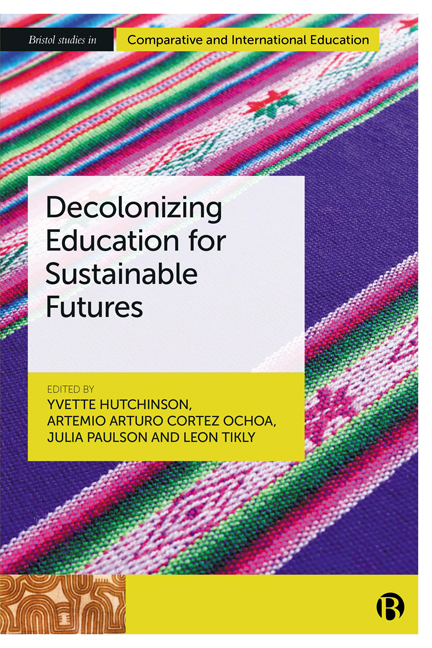Book contents
- Frontmatter
- Contents
- Series Editor Preface
- List of Figures and Table
- List of Abbreviations
- Notes on Contributors
- Acknowledgements
- Introduction
- PART I Connecting Decolonial and Sustainable Futures in Education
- PART II Decolonizing Education for Sustainable Futures: From Theory to Practice
- PART III Education’s Reparative Possibilities: Responsibilities and Reckonings for Sustainable Futures
- Conclusion
- Afterword
- Index
5 - British Council Dialogues on Decolonization
Published online by Cambridge University Press: 18 January 2024
- Frontmatter
- Contents
- Series Editor Preface
- List of Figures and Table
- List of Abbreviations
- Notes on Contributors
- Acknowledgements
- Introduction
- PART I Connecting Decolonial and Sustainable Futures in Education
- PART II Decolonizing Education for Sustainable Futures: From Theory to Practice
- PART III Education’s Reparative Possibilities: Responsibilities and Reckonings for Sustainable Futures
- Conclusion
- Afterword
- Index
Summary
When we finished the Series, we did an evaluation. … I said, what's the audacious goal; that the organisation makes a public statement to commit to looking at decolonisation. Sometimes you have to ask for the audacious win; the audacious ask … [it] must be on the table to be turned down. It's fine if they say no but let's make them consciously say no. It's important that they are aware of what they are saying no to. And they can't say no if you don't ask. … [It] forces the thought process.
Interviewee AIntroduction
The aim of this chapter is to reflect on grassroots activity and corporate strategy relating to decolonization at the British Council. The first was a staff-led, decolonization webinar series. The second was an anti-racism action plan driven by senior leaders. The chapter begins with an outline of the British Council's role and purpose and the events that took place in the summer of 2020. It identifies themes that emerged from interviews conducted with those involved in the Decolonisation Series and the antiracism plan and places them within a framework that shows how the process for decolonization at the British Council began.
The British Council
The British Council builds connections, understanding and trust between people in the UK and other countries through arts and culture, education and the English language. The British Council works in two ways – directly with individuals and with governments and partners. Working in English and arts and culture, the British Council connects the best of the UK with the world and the best of the world with the UK. These connections lead to an understanding of each other's strengths and of the challenges and values that we share. This builds a trust between people in the UK and other nations that endures even when official relations may be strained. The British Council has over 10,000 members of staff in offices, teaching centres and libraries in the UK and more than 100 countries and territories worldwide. In 2019– 20 we connected with 76 million people directly and with 983 million people overall, including online and through our broadcasts and publications.
- Type
- Chapter
- Information
- Decolonizing Education for Sustainable Futures , pp. 101 - 118Publisher: Bristol University PressPrint publication year: 2023

